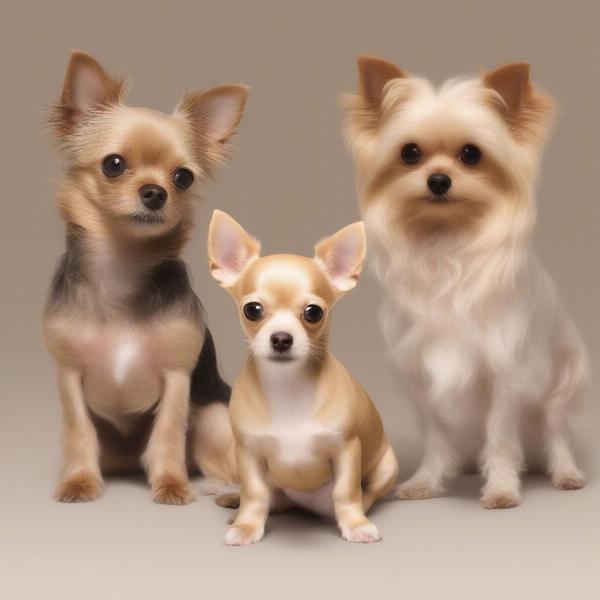The term “xxs dog” often sparks curiosity, conjuring images of incredibly small canines. While not an official breed classification, “xxs dog” typically refers to the smallest of toy breeds, often weighing under 4 pounds. These diminutive dogs require specific care and understanding, making informed decisions crucial for their well-being. This article explores the world of xxs dogs, covering everything from breed considerations to health concerns, training tips, and the unique joys and challenges that come with owning these tiny companions.
Understanding the commitment involved in caring for an xxs dog is paramount. Their small size presents unique considerations, ranging from potential health issues to specific dietary needs. Choosing an xxs dog should be a well-informed decision based on thorough research and a realistic assessment of your lifestyle.
Choosing the Right XXS Breed
While the term “xxs” isn’t official, several breeds consistently fall into this tiny category. Chihuahuas, known for their spirited personalities, are arguably the most recognized xxs breed. Yorkshire Terriers, with their long, flowing coats, also frequently fall within this size range. Other breeds that can be xxs include Teacup Poodles, miniature Pomeranians, and the Russian Toy Terrier.
Researching different xxs breeds is essential to find a dog whose temperament and needs align with your lifestyle. Consider your living situation, activity level, and experience with dogs. Some xxs breeds are more energetic than others, while some require more grooming.
 XXS Dog Breeds: Chihuahua, Yorkshire Terrier, Teacup Poodle
XXS Dog Breeds: Chihuahua, Yorkshire Terrier, Teacup Poodle
Health and Care for XXS Dogs
Due to their size, xxs dogs can be prone to specific health issues. Hypoglycemia (low blood sugar) is a common concern, requiring careful monitoring and regular feeding. Dental problems are also prevalent, necessitating regular teeth cleaning and veterinary checkups. Additionally, xxs dogs can be more fragile and susceptible to injuries, requiring a cautious and mindful approach to handling.
Providing proper nutrition is vital for xxs dogs. Their small stomachs require frequent, small meals throughout the day to maintain stable blood sugar levels. Choosing a high-quality, small-breed-specific dog food is essential for providing the necessary nutrients in appropriate portions.
Training and Socialization for XXS Dogs
Training an xxs dog requires patience and consistency, just like any other breed. Positive reinforcement methods, such as rewarding desired behaviors with treats and praise, are highly effective. Early socialization is crucial to expose your xxs dog to various sights, sounds, and experiences, helping them develop into well-adjusted adults.
While their small size might tempt owners to be overly protective, it’s crucial to avoid carrying your xxs dog everywhere. Allowing them to walk and explore, under supervision, fosters independence and confidence.
The Joys and Challenges of Owning an XXS Dog
Owning an xxs dog brings unique joys. Their portability allows for easy travel and inclusion in various activities. Their small size makes them ideal companions for apartment living. However, the challenges of owning an xxs dog should not be overlooked. Their fragility requires constant vigilance, and their specialized care can be demanding.
Conclusion
XXS dogs, while undeniably adorable, require a significant commitment. Understanding their unique needs and challenges is essential for ensuring their well-being and happiness. From breed selection to health care and training, responsible ownership plays a vital role in providing these tiny companions with the fulfilling life they deserve. Thorough research and a realistic assessment of your lifestyle will pave the way for a rewarding experience with your xxs dog.
FAQ
- What is the lifespan of an xxs dog? XXS dogs typically have a lifespan similar to other toy breeds, ranging from 12 to 16 years.
- Are xxs dogs good with children? While some xxs breeds can be tolerant of children, their fragility makes them more susceptible to injury from accidental mishandling. Close supervision is always necessary.
- How often should I feed my xxs dog? XXS dogs require frequent, small meals throughout the day, typically 3-4 times.
- Do xxs dogs need a lot of exercise? While their exercise needs are less demanding than larger breeds, they still require regular walks and playtime.
- Are xxs dogs prone to barking? Some xxs breeds, like Chihuahuas, are known for their vocal tendencies. Proper training can help manage excessive barking.
- What is the best food for an xxs dog? High-quality, small-breed-specific dog food is crucial for meeting their nutritional needs. Consult with your veterinarian for recommendations.
- How much grooming do xxs dogs require? Grooming needs vary depending on the breed. Some require regular brushing, while others may need professional grooming.
About ILM Dog: ILM Dog is your global resource for expert dog care and nurturing advice. We provide reliable, practical information on all aspects of dog ownership, from breed selection and health care to training and nutrition. We cater to dog owners of all experience levels, offering insights into various breeds, health concerns, training methods, dietary recommendations, and product reviews. Contact us at [email protected] or +44 20-3965-8624 for expert advice tailored to your dog’s needs.